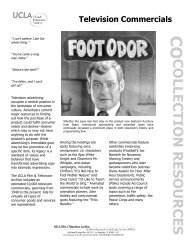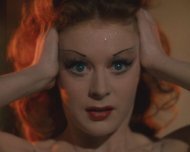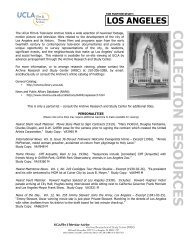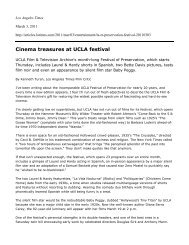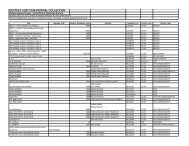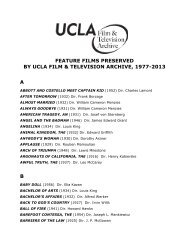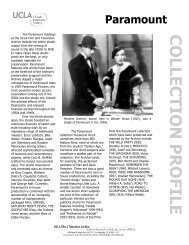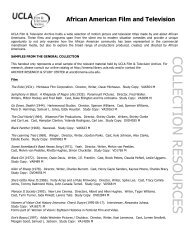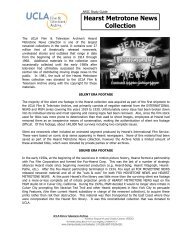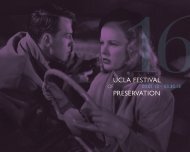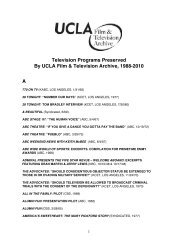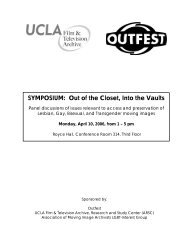"Heroic Grace" catalog - UCLA Film & Television Archive
"Heroic Grace" catalog - UCLA Film & Television Archive
"Heroic Grace" catalog - UCLA Film & Television Archive
Create successful ePaper yourself
Turn your PDF publications into a flip-book with our unique Google optimized e-Paper software.
tion or were heartsick over the domination of China by foreign powers.<br />
Yet Liang and Jin were also shrewd enough to retain what was most<br />
attractive in the work of their predecessors, the supernatural powers<br />
depicted by Huanzhu Louzhu, and the doomed loves movingly portrayed<br />
by Wang Dulu. The penetration of these works into the everyday lives of<br />
Asians cannot be overstated. Jin Yong, arguably the most important<br />
wuxia author in history, reports in the revised edition of Laughing with<br />
Pride over Jiang Hu (Xiao’ao Jiang Hu, a.k.a. The Smiling, Proud Wanderer)<br />
that when the novel was serialized in Saigon newspapers during the<br />
Vietnam War, government officials embroiled in policy debates used the<br />
names of its villains as curses to insult their rivals. 28<br />
Hong Kong cinema was also enjoying a growth spurt in the 1950s, and<br />
filmmakers naturally looked to the most popular wuxia novels for material.<br />
The novels of Jin Yong and Liang Yusheng, which often had dozens of<br />
chapters and hundreds of thousands of words, were typically adapted in<br />
several feature-length installments. Jin’s Legend of the Brave Archer (She<br />
Diao Yingxiong Chuan, 1957) and Story of the Book and the Sword (Shu<br />
Qian En Chou Lu, 1955), and Liang’s Story of the White-Haired Demon Girl<br />
(Baifa Monü Chuan,1959) and Three Women Warriors (Jiang Hu San Nüxia,<br />
1960) were all made with one or more sequels.<br />
It was only years later that Jin Yong’s and Liang Yusheng’s works were<br />
enacted again on the big screen, although they had continued to be staple<br />
fare on television. In the 1990s, Tsui Hark and Ching Siu-tung turned<br />
Jin’s Laughing with Pride over Jiang Hu into the SWORDSMAN series (XIU<br />
NGO KONG WOO/XIAO’AO JIANG HU, 1990-1993). Wong Kar-wai’s partner<br />
Jeffrey Lau adapted Jin’s The Eagle Lovers (Shen Diao Xia Lu, 1959) as<br />
SAVIOR OF THE SOUL (GAO YAT SAN DIU HAP LUI/JIUYI SHEN DIAO XIA LU,1991),<br />
and Wong himself took Legend of the Brave Archer (The Eagle-Shooting<br />
Heroes) as the jumping-off point for ASHES OF TIME (TONG CHE SAI DUK/<br />
DONGXIE XIDU, 1994), a new prequel that re-imagined the early lives of<br />
two of the novel’s minor characters. And Ronny Yu presented his own set<br />
of variations on Liang’s Story of the White-Haired Demon Girl in THE<br />
BRIDE WITH WHITE HAIR (BAK FAT MOH LUI CHUEN/BAIFA MONÜ CHUAN, 1993).<br />
Consistent with the flamboyant, high-flying style of 1980s and ’90s Hong<br />
Kong cinema, these were really reinterpretations of, even challenges to,<br />
the wuxia myth rather than true adaptations, executed with the directorial<br />
virtuosity and personal visions of a new school of filmmakers.<br />
The hiatus in adaptations of classic wuxia stories was occasioned by<br />
a tide of change that swept through Hong Kong cinema in the 1960s and<br />
’70s, spearheaded by the so-called “new school” of Mandarin wuxia films.<br />
With their elaborately staged action, quick-tempo editing and punchy<br />
plots, the films of Zhang Che (Chang Cheh), King Hu and others made the<br />
relatively faithful adaptations favored by Cantonese cinema look stilted<br />
and threadbare. Hu and Zhang, the top auteur directors of this new<br />
movement, which propelled the Hong Kong film industry into the “kung<br />
fu” era, preferred original scripts that they could shape from the ground<br />
up. Both adept visual stylists, they were also more concerned with the<br />
bravura staging of fight sequences than with plot or character. But that<br />
didn’t mean that the film industry had come entirely out of the wuxia<br />
novel’s shadow. Novelist Ni Kuang (The Six-Fingered Lord of the Lute)<br />
plunged headlong into movies as an astonishingly prolific screenwriter,<br />
turning out literally hundreds of scripts and affecting great changes in<br />
the martial arts cinema. The central plot point of Ni Kuang’s script for<br />
Zhang Che’s ONE-ARMED SWORDSMAN (DUBI DAO, 1967), the film that ushered<br />
in the Mandarin wuxia era, was inspired by a major incident in Jin<br />
Yong’s The Eagle Lovers, in which the hero’s arm is hacked off by one of<br />
his “martial sisters.”<br />
28 Jin Yong, “After Words,” in Laughing with Pride over Jiang Hu (Hong Kong: Ming<br />
Pao Publishing, 1989), p. 1691.<br />
16<br />
Meanwhile, the wuxia novel, too, had continued to evolve. About a<br />
decade after the first appearance in print of Jin Yong and Liang Yusheng,<br />
another major “new style” figure emerged. Operating out of Taiwan,<br />
Gu Long rose to prominence in the mid-1960s and introduced radical<br />
changes that adapted the genre to the spirit of a new generation. Gu’s<br />
language was sparse and stylized, using totally unexpected words in<br />
increasingly short sentences and paragraphs, some only one word long.<br />
His dialogue, too, was laconic to a fault, forcing readers to intuit the<br />
characters veiled intentions. As such, his writing was thick with atmosphere,<br />
suggestive of the unknown and the dangerous. This style was<br />
perfectly suited to Gu’s intrigue-filled stories of rivalries between farflung<br />
secret societies, influenced by detective thrillers and the James<br />
Bond films.<br />
In a drastic departure from traditional wuxia novels, even those of<br />
other “new style” authors like Jin and Liang, Gu Long’s “hard-boiled”<br />
characters were not bound by any chivalrous code. Instead, they were<br />
amoral creatures not above fighting for money and gleefully indulging in<br />
mind games of manipulation, deception and betrayal. When they fight,<br />
they shun the elaborate martial moves of previous heroes, investing<br />
their energy instead in lengthy pre-fight confrontations that culminate<br />
in quick flurries of lethal blows, obviously influenced by the explosive<br />
encounters in samurai films and spaghetti Westerns. In fact, Gu Long’s<br />
writing was extremely cinematic, frequently adapting to prose such<br />
filmic techniques as mise-en-scène and rapid-fire editing, creating<br />
“stage pictures” in an almost theatrical sense with evocative physical<br />
descriptions. Which is exactly why he was able to effortlessly switch to<br />
screenwriting in the 1970s, penning scripts in Hong Kong and Taiwan that<br />
unmistakably bear his personal stamp, such as JADE TIGER (BAI YU LAO HU,<br />
1977) and MAGNIFICENT BODYGUARD (FEI DU JUAN YUN SHAN, 1978).<br />
Gu Long’s novels were also popular fodder for adaptation by other<br />
filmmakers. Most notable among them was director Chu Yuan (Chor Yuen),<br />
who filmed many of Gu’s novels, most of them scripted by Ni Kuang. Chu<br />
skillfully recreated the author’s world on film, using spectacular highwire<br />
fight scenes, colorful costumes and fancy sets to realize the novel’s<br />
convoluted whodunit plots and quasi-existential plays of greed and<br />
desire. His adaptations were so faithful in spirit and so successful at the<br />
box office that they can be categorized as a Chu Yuan-Ni Kuang-Gu Long<br />
subgenre, with its own formulaic conventions and iconoclastic style.<br />
New wuxia novels continue to be written and are still quite popular,<br />
though not nearly as hot as they were in the 1960s and ’70s. By and<br />
large, modern Chinese moviegoers seem to find more resonant metaphors<br />
for the conflict and striving of their lives in the wuxia surrogates<br />
of the gangster genre. On the other hand, a young writer named Yi Huang<br />
was the number one bestseller in Hong Kong for several months in 2002<br />
with his epic Legends of the Far Wasteland; his earlier novel, Looking<br />
for Qin, is currently being adapted for television. Could this be the beginning<br />
of yet another “new style” of wuxia cinema, with fiction once again<br />
leading the way?<br />
copyright @ 2003, Sam Ho<br />
Sam Ho teaches at the Chinese University of Hong Kong and is the editor<br />
of the book, The Swordsman and His Jiang Hu: Tsui Hark and Hong Kong<br />
<strong>Film</strong>. He divides his time between Hong Kong and Houston, Texas, and is a<br />
former correspondent for Variety and a former editor of the Hong Kong<br />
International <strong>Film</strong> Festival.



